Class 3 Exam > Class 3 Notes > GK Olympiad for Class 3 > Notes: Language and Literature
Notes: Language and Literature | GK Olympiad for Class 3 PDF Download
| Table of contents |

|
| Introduction |

|
| Collective Nouns |

|
| Mass Nouns |

|
| Compound Words |

|
| Opposite Words |

|
| Homophones |

|
| Idioms and Phrases |

|
| Literature |

|
Introduction
Words are the foundation of every language. Using words correctly is essential for effectively conveying messages.
Collective Nouns
A collective noun refers to a group of people, animals, or objects. These words are also known as group words because they represent multiple nouns as a single entity.
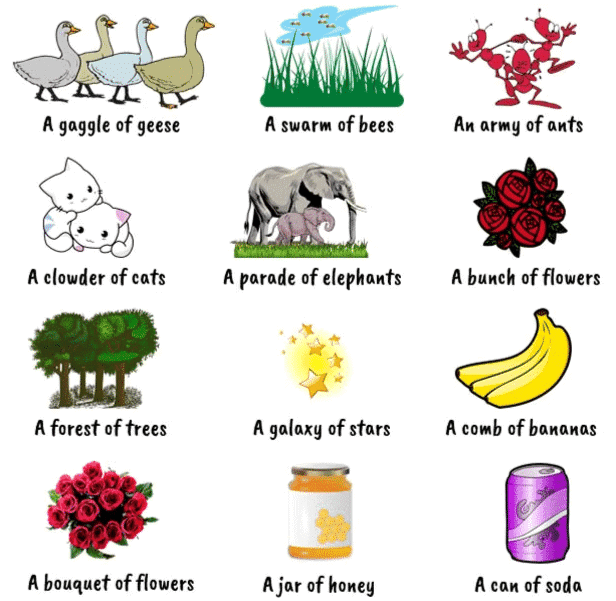
Common Collective Nouns
Animals:
- A pride of lions
- A herd or parade of elephants
- A flock of camels
- A team of horses
- A leap of leopards
- A tower of giraffes
- A flock of sheep
- A clowder of cats
- A colony of ants
- A flutter of butterflies
- A flock of birds
- A swarm of bees
- A scourge of mosquitoes
Objects & People:
- A fleet of aeroplanes or ships
- A class of students
- A school of fish
- A range of mountains
- A deck of cards
- A library of books
- A crowd of people
- A bunch of keys
- A bouquet of flowers
Mass Nouns
Mass nouns are collections of different items grouped under a single term.
- Stationery: Paper, pen, pencil, eraser, clips, sharpener, ruler, etc.
- Furniture: Sofa, bed, table, chair, cupboard, etc.
- Cutlery: Knives, forks, spoons, etc.
- Family: Parents, siblings, grandparents, aunts, uncles, cousins, etc.
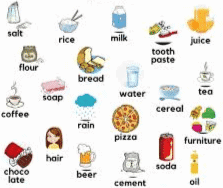
Compound Words
Compound words are created when two smaller words combine to form a new word.
Examples:
- Birthday = Birth + day
- Butterfly = Butter + fly
- Notebook = Note + book
- Milkshake = Milk + shake
- Backbone = Back + bone
- Bookshelf = Book + shelf
- Blackboard = Black + board
- Fisherman = Fisher + man
- Grasshopper = Grass + hopper
- Inside = In + side
Opposite Words
Opposite words convey meanings that contrast each other.
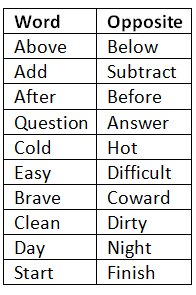
Homophones
Homophones are words that sound the same but have different spellings and meanings.
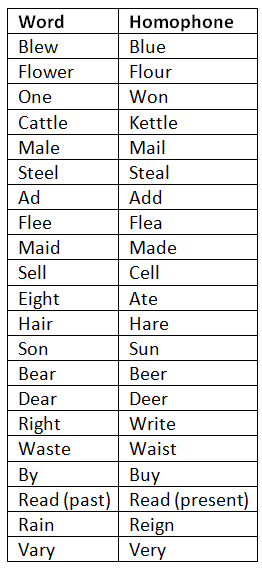
Idioms and Phrases
Idioms are phrases that have figurative meanings different from their literal interpretations.
- To break the ice: Start a conversation
- To carry a thing too far: Exceed safe limits
- To catch one’s eye: Attract attention
- To get rid of: Free oneself from something
- To hold one’s tongue: Remain silent
- To hold one’s head high: Show pride
- To play into the hands of others: Benefit someone unintentionally
- To put to shame: Disgrace someone
- To throw dust in one’s eyes: Deceive someone
- To see eye to eye: Agree completely
- A wet blanket: Someone who dampens enthusiasm
- A wild goose chase: A futile pursuit
- To live in a fool’s paradise: Maintain false hopes
- The ins and outs: Secrets or details
- An eye-wash: A pretentious act
- Out of the question: Impossible
- To throw cold water: Discourage an idea
Literature
A list of well-known books and their authors: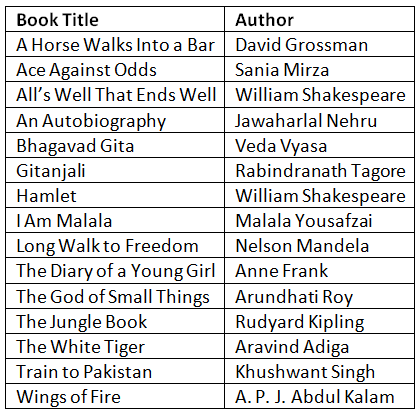
The document Notes: Language and Literature | GK Olympiad for Class 3 is a part of the Class 3 Course GK Olympiad for Class 3.
All you need of Class 3 at this link: Class 3
|
46 videos|31 docs|44 tests
|
FAQs on Notes: Language and Literature - GK Olympiad for Class 3
| 1. What are collective nouns and can you provide some examples? |  |
Ans. Collective nouns refer to a group of individuals or items considered as a single unit. Examples include "flock" for birds, "team" for players, and "class" for students.
| 2. How do mass nouns differ from collective nouns? |  |
Ans. Mass nouns, also known as uncountable nouns, refer to substances or concepts that cannot be counted individually, such as "water," "sand," or "information." Unlike collective nouns, which represent groups, mass nouns represent a whole that cannot be separated into individual units.
| 3. What are compound words and how are they formed? |  |
Ans. Compound words are formed by combining two or more words to create a new word with a specific meaning. For example, "toothbrush" (tooth + brush) and "basketball" (basket + ball) are compound words.
| 4. Can you give examples of opposite words and their meanings? |  |
Ans. Opposite words, or antonyms, are words that have contrasting meanings. For instance, "hot" is the opposite of "cold," and "happy" is the opposite of "sad." These pairs help convey different ideas or states.
| 5. What are some common idioms and their meanings? |  |
Ans. Idioms are phrases where the meaning is not directly derived from the individual words. For example, "break the ice" means to initiate conversation in a social setting, and "spill the beans" means to reveal a secret. Understanding idioms enhances comprehension of language nuances.
Related Searches















